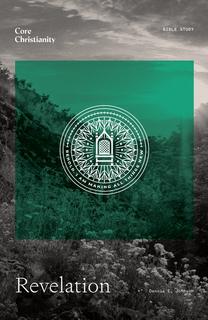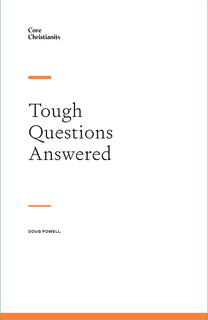The Bible talks about the end in many places. In fact, we first learn about the end of history in Genesis 2:1–3. God rested on the seventh day, having finished making the universe. He intended humans, made in his image, to join him in that rest after completing the work he gave them. From the very beginning, God had the end in mind.
The Bible concludes with an image of this final communion of God and his people: “Behold, the dwelling place of God is with man. He will dwell with them, and they will be his people, and God himself will be with them as their God. He will wipe away every tear from their eyes, and death shall be no more.” (Rev. 21:3–4).
The term end times usually refers to the events at the end of world history that lead to this final state of blessedness. Usually, Christians describe views of the end times in terms of the previous chapter in the book of Revelation. That’s where the Bible describes the millennium:
Then I saw thrones, and seated on them were those to whom the authority to judge was committed. Also I saw the souls of those who had been beheaded for the testimony of Jesus and for the word of God, and those who had not worshiped the beast or its image and had not received its mark on their foreheads or their hands. They came to life and reigned with Christ for a thousand years. (Rev. 20:4)
What is this thousand-year reign of Jesus Christ? When does it happen? The three main answers to these questions are called Premillennialism, Postmillennialism, and Amillennialism.
What is Premillennialism?
Premillennialists believe that Christ will return before his millennial reign on earth. There are two different Premillennial views.
Historic Premillennialism
In Historic Premillennialism, several significant things happen before Christ returns, including the evangelization of the world, the great tribulation, and the coming of the Antichrist. When Christ returns, he raises believers from the dead, defeats the Antichrist and begins to rule. Jewish and Gentile Christians reign with him as his people.
But it isn’t yet the end. Sin and death remain, and unbelievers continue to live on earth. Christ reigns for a thousand years, but then Satan is set free, leading to the Battle of Armageddon. After Christ’s victory, he raises the unrighteous and executes the last judgment. At this point, every human being goes to his eternal state: believers enter the new heavens and new earth, while unbelievers go the lake of fire.
This view is called Historic Premillennialism to distinguish it from dispensationalism. It is historic because this view, like Postmillenialism and Amillennialism, can be traced back to the early church.
Dispensational Premillennialism
Dispensational Premillennialism is a modern view, developed in the 19th century. Dispensationalists, like Historic Premillennialists, believe that Christ will return before a thousand-year earthly reign. But they differ about many other things. In particular, Dispensationalists usually say that God has separate plans of salvation for Jews and Gentiles. There are two peoples of God, not one.
Dispensationalists believe that when Christ first came, he offered the Kingdom of Heaven to the Jews, who rejected it. As a result, the coming of the Kingdom has been postponed. In the meantime, God has created the church, something that Dispensationalists believe the Old Testament prophecies never referred to. The prophets only spoke of the Kingdom of Heaven.
This church age will end with the rapture, which is the first part of Christ’s return. Living Christians will be taken up into the air to be with Christ and those who have died will be raised. The Antichrist will then reign on earth, but a remnant of Israel will remain faithful to God. The Battle of Armageddon brings this period to an end. At that point, Christ will come a third time, now with the church, and establish the millennial Kingdom. Israel will then turn to Christ, and Satan will be bound.
At the end of Christ’s thousand-year reign, Satan will be loosed but then destroyed. God will raise the unrighteous, and all people will enter their eternal states. Israel and the church will remain distinct peoples of God forever.
What is Postmillennialism?
Postmillennialists, like Premillennialists, believe that Christ will return and establish his Kingdom on earth. Postmillennialists, though, believe this will happen after the millennium. They believe the world will get better as the gospel reaches more and more people. This will lead to the millennium—a golden age of church influence throughout the world.
Postmillennialists believe some Old Testament prophecies weren’t fulfilled in Christ’s first coming. These must still be fulfilled on earth. This is the main difference between Postmillennialists and Amillennialists.
What is Amillennialism?
Amillennialists believe that the millennium is the whole period between Christ’s first and second coming. We live during the millennium now. Therefore, Amillennialists don’t believe in a future earthly reign of Christ. When Christ returns, the last judgment and the resurrection will occur (John 5:28–29). History will be over.
According to Amillennialists, the New Testament consistently says that Christ’s reign has already begun (Matt. 28:18; Eph. 1:20–22). He’s already defeated Satan (Matt. 12:28–29; Col. 2:15; 1 John 3:8). Ammillennialists believe the thousand-year millennium in Revelation 20 is symbolic.
He Will Come Again in Glory
All orthodox Christians affirm the words of the Nicene Creed: Jesus Christ “will come again in glory to judge the living and the dead; whose kingdom shall have no end.” Each of these views of the end times affirm this same blessed hope. All who trust in Christ will see him face to face and live with God forever.
But different views of the millennium are not insignificant. They can lead to profoundly different ways of understanding the church and the Christian life. As believers, we can celebrate the hope we share while seeking—with patience and grace—to be more fully unified in the truth God’s word reveals about the end.
What Does the Bible Say?
- Gen. 2:1–3; Dan. 9:24–27; Matt. 24; Mark 13; John 5:25–29; Acts 1:11, 24:15; 1 Thess. 4:13–5:11; 2 Thess. 1:5–2:12; 1 John 2:18; Rev. 20–22
Recommended Resources
- Three Views on the Millennium and Beyond edited by Stanley N. Gundry
- The Bible and the Future by Anthony Hoekema
- A Case for Amillennialism by Kim Riddlebarger
- The Triumph of the Lamb: A Commentary on Revelation by Dennis E. Johnson
- A Case for Historic Premillennialism: An Alternative to “Left Behind” Eschatology edited by Craig L. Blomberg and Sung Wook Chung
- The Future of Everything: Essential Truths About the End Times by William Boekestein









